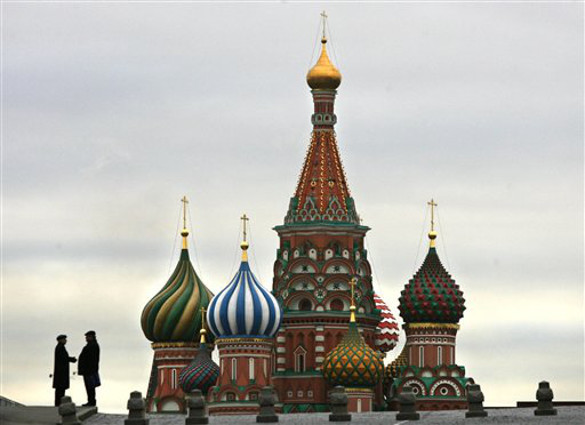Turkey and Russia can eliminate risk of new bipolar world order
By Harun Yahya

Events in Ukraine and Syria, and recent tensions between the Western world and Russia, show that we have reached a new turning point in international relations based on trade and financial restrictions. The U.S. has chosen to manipulate oil prices, using a method left over from the Cold War, in order to hurt Russia. The Russian economy and those of the European Union and the U.S. have been harmed in the same way in the process. The U.S. is now preparing to sign a new Transatlantic Free Trade Agreement with the EU in order to overcome that damage. Russia, on the other hand, is taking new measures to grow its economy with its neighbors to the east and southeast, and particularly Turkey.
Russia needs to diversify its economy, not just to fix it, but also in order to protect it. It therefore needs to come out of its shell and to take political steps that can inspire confidence in and attract foreign investors. Exactly that idea was expressed at a press conference by Vladimir Putin last month. He has one actively proven ally in this task, Turkey's President Erdoğan.
Turkey has taken great strides, particularly in the economy and in attracting foreign investors in the last 12 years: It is Europe's fastest growing economy[i]. With far more limited means at its disposal compared to Russia, Turkey has managed to become one of the most popular countries with foreign investors during the era of the AKP government. Since Russia is under economic sanctions by all Western countries, it can engage in an exchange of knowledge with its neighbor that refuses to leave it standing isolated during this time.
Turkey has used various means in order to ease the way for foreign investors and make itself attractive. For example, the time it takes to set up a company in Turkey has been reduced from thirty-eight days to six, allowing it to benefit from the waiting investor portfolio without letting it slip away. Turkey attracted $123 billion foreign investment between 2003 and 2012. In doing that, it also passed new laws to prevent national investors from suffering. It guaranteed that Turkish and foreign investors would enjoy equal rights.
One of the issues most important to foreign investors is the safety of future investments and tax regulations. With its new liberal and reformist legal arrangements, Turkey has guaranteed the position of foreign investors in the country. It developed practical models in which many fundamental investments - that have come to represent national wealth by means of the state-promoted build-operate-transfer model - have become profitable for both the investor and the host state. In this way, the number of international companies active in Turkey has exceeded 34,000 as of 2014. By means of this active and fast-earning model, Turkey has quickly managed to complete basic investments to allow it to diversify its own economy. Putin's aim of pulling the Russian economy out of its bottleneck and diversifying it within two years can be possible by drawing even closer to Turkey, with which relations have particularly improved during the time of the AKP government. Placing international companies under legal guarantee, facilitating the taxation of revenues, simplifying to set up companies and to get work permit will all assist foreign investors turning their assets toward Russia.
We know that Putin and Erdogan espouse the idea that political and ideological differences should not affect the business sphere. For example, although there are various disagreements between Erdoğan and Israel, business and tourism ties with Israel have continued to grow, even after the Mavi Marmara incident of 2009, and have helped the two peoples remain close and regard one another as friends. Putin has not objected to Jordan, a stalwart ally of the U.S., planning to set up an agricultural zone with foreign aid received from the U.S. in the Russian region of Sochi. This alone reveals that the two leaders have similar outlooks when it comes to business and are well suited to work together in the economic sphere.
One of the steps that Russia needs to take to attract at least as much foreign investment as Turkey is to establish a more transparent investment legislation for international businessmen. Winston Churchill's description of Russia as "a riddle wrapped up in a mystery inside an enigma" must finally be erased from Western investors' minds. Since Putin came to power, he has emphasized the idea of liberalization without being deracinated and that does not recall the old Soviet regime. In addition, Russia will always benefit in the diplomatic arena from ties it establishes through trade. For example, since it stood to make a trading loss of billions of dollars if it imposed sanctions on Russia, France agreed to participate in the EU's economic sanctions on condition that its losses would be compensated for. Looking at President Hollande's most recent statement,[ii] France was the first country to call for a complete lifting of sanctions in the face of even the slightest improvement. Israel has also been affected by the sanctions, since fewer Russians are visiting it due to the bad economy,[iii] and is one of those countries most often calling for them to be lifted.
Tensions between countries, regions or blocs can be ended for a number of reasons. Trade has always been one of the most effective and positive means to that end. Russia must diversify its industry and attract greater foreign investment, not just to increase the value of the rouble today, but also to put the Russian economy on a sounder footing in the future. It will be in Russia's interest to collaborate with Turkey, which has already proven itself in this area.
Harun Yahya
Turkey
[i] https://kdk.gov.tr/sayilarla/turkiyeye-gelen-uluslararasi-yatirim/46
[ii] https://www.bbc.com/news/world-europe-30679176
[iii] https://www.i24news.tv/en/news/israel/society/55143-141221-israel-tourism-industry-to-suffer-heavy-blow-following-sanctions-on-russia
Subscribe to Pravda.Ru Telegram channel, Facebook, RSS!





